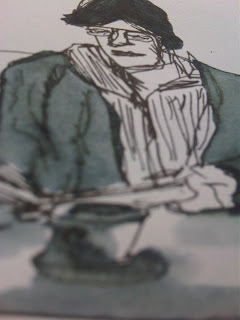Joan Jonas
December 18, 2009–May 31, 2010
MOMA, New York

Inspired by a trip the artist took to India, Joan Jonas’s Mirage (1976/2005) was originally conceived as a 1976 performance for the screening room of New York’s Anthology Film Archives. In it, Jonas carried out a series of movements, such as running as a form of percussion and as gestural drawing, while interacting with a variety of sculptural components and video projections. In 1994, the artist repurposed these elements—metal cones suggesting the form of volcanoes, videos of erupting volcanoes, wooden hoops, a mask, photographs, and chalkboards, among other items—as a discrete installation, which was itself reconfigured in 2005. At MoMA, the artist once again reimagines the work in an installation that combines elements of ritual, memory, repetition, and rehearsal with games, drawn actions, and syncopated rhythms.
Joan Jonas is a Professor of Visual Arts in MIT in America.
http://web.mit.edu/vap/workandresearch/workfaculty/work_jjperf.html



























